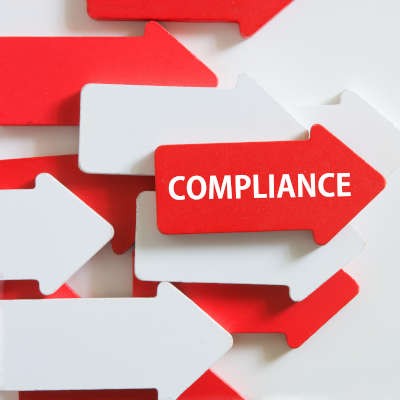Artificial intelligence, or AI, has upended the way that we discuss technology in business, society, and individual everyday life. While we mostly focus on the benefits of the technology, there are many downsides to consider as well. That’s what we’d like to discuss today; how AI has a dark side to it that potentially requires regulation.
k_Street Consulting, LLC Blog
Would you feel safe staying at a hotel that, instead of unique locks, each door used the same key as all of the others? Probably not—because if someone got in, they could take whatever they wanted. That’s similar to how old-school cybersecurity worked. Once someone got into a company’s network, they could access almost everything, making it easy for hackers to steal information. But today, many businesses use a better security framework called zero-trust security. In today’s blog, we discuss what zero-trust security is and why it’s safer.
While the word “audit” can easily be a scary thought for businesses, there are certain cases where an audit serves an organization’s direct benefit. Take, for instance, the ones that occur internally to identify and correct security issues and vulnerabilities. These audits are not only a positive endeavor for businesses; they’re extremely important to carry out.
Let’s talk about why this is and review a few standard practices you should prioritize as you go about this process.
Your business is likely subject to certain compliance laws and regulations depending on the type of data you collect from your clients or customers. Today, we want to emphasize the importance of your business considering regulation and compliance when managing its data and IT resources, as without doing so, you run considerable risk.
You might think that adding additional security measures can only benefit your business, and this is true in most circumstances, save one: security exhaustion. If you don’t make it easy for your employees to adhere to your security policies, then you could inadvertently be making them perform slower than usual and your solutions could be getting in the way of their work.
In today’s interconnected world, an organization dedicated to fraud protection like the United States Federal Trade Commission is vital, especially when you consider how advanced digital technology has become and continues to grow. The FTC works to ensure consumer data stays protected by the businesses to which they entrust it. Let’s look at the Safeguards Rule and what your business should know about it.
Cloud computing has become one of the most utilized technologies in business today, and it doesn’t seem to be slowing down anytime soon. It makes it possible for nearly any business to acquire advanced technologies that they could not afford previously, and use them to level the playing field with larger, more capital-rich companies. This month we thought we’d talk a little bit about how moving to the cloud can benefit you and your business.
To meet compliance requirements for technology an organization will need to understand the regulations they operate under. New entrepreneurs may find it startling when they realize that they have a lot more people/organizations to answer to than they thought. This week, we aren’t going to go through individual regulations, but how IT generally fits into compliance and how not staying up to date can cost your business dearly.
The modern cyberthreat landscape is nothing to be trifled with, so it makes sense that as threats grow more powerful, so too do the solutions used to address them. Nowadays, there is a practice that is designed to address just how serious the threat of cybersecurity is: zero-trust IT. Let’s discuss these policies and how you might put them in place.
For much of the past decade, data privacy has been a big issue. Ever since information was unveiled on how major tech companies (and other companies) use the information gleaned from their users, there has been a cross-section of people who have started to fight back against it. Unfortunately for Americans, this hasn’t resulted in an overarching data privacy law that protects people and their personal data. This month, we’ll take a look at the data privacy environment and discuss why there haven’t been any moves by U.S. lawmakers to protect data privacy.
Most companies have some sort of regulation they need to stay compliant to, and 2021 seems to be a landmark year. Over the past year, companies have had to deal with a growing remote workforce, end-of-life upgrades, the development of new privacy laws, as well as the existing regulatory landscape. Let’s take a look at why compliance is important for your business.
Regulations are put in place for a reason: the data you keep is sensitive. Within certain environments, it is extremely important to know how to navigate so as not to mistakenly expose information that has no business being shared. This month, we thought it would be a good time to talk about how to navigate these highly-regulated environments to ensure success and security.
Does your business accept credit cards? Of course it does. Regardless of what industry you are in, your customers are now using payment cards for a large portion of their retail transactions both online and in-store. To protect consumers, there has been a compliance standard enacted by credit card companies. Today we will look at this standard.
To the average person there are some definite blurred lines between IT security and IT compliance. In fact, these lines are so blurry to most people that they would consider them the same thing. They aren’t. How is it possible to create a fully compliant, completely secure computing environment? You start by understanding how to make both possible.
Maintaining network security for a small business has been known to be a major challenge, but not for a lack of effort. Due to the unique budget restraints and workforce troubles that are associated with a smaller organization, security is known to suffer considerably for a number of reasons. On top of worrying about network security maintenance, you need to worry about the many threats that continue to evolve with each and every passing day. How will you keep your business assets secure in 2018?
When you sit down with new prospects, you rarely talk about data security. The client is usually focused on the problem they have that has made them come to you in the first place, while you are likely focused on closing in on bringing critical revenue into your business. That doesn’t mean that data security isn’t an extremely big issue, it just that without business, it is a non-issue.
There will always be standards that must be upheld in regard to compliance and regulations, regardless of which industry your organization falls into. Still, considering the results of the 2016 State of Compliance survey, you’ll be shocked to hear that there are countless businesses out there that don’t understand what’s required of them.
 The latest in a string of costly settlements associated with the violation of the HIPAA law highlights the importance of your health care organization closely following HIPAA’s mandates. Is your practice’s IT infrastructure HIPAA compliant? If not, then even an overlooked detail as seemingly-insignificant as updating software will subject you to penalties.
The latest in a string of costly settlements associated with the violation of the HIPAA law highlights the importance of your health care organization closely following HIPAA’s mandates. Is your practice’s IT infrastructure HIPAA compliant? If not, then even an overlooked detail as seemingly-insignificant as updating software will subject you to penalties.




















